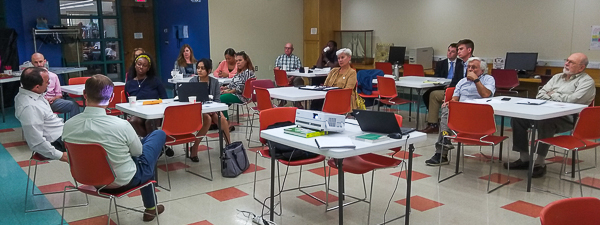Outreach, Community Organization & Advocacy

Strategy
The strategy of the Stop Bullying Coalition is to continue seeking action on Beacon Hill, and doing outreach and education in local communities. This outreach work will help empower tenants to organize in their housing developments, to do community outreach, and to build local coalitions that can educate their communities as well as grow our roster of advocates.
We are working to develop materials to help guide tenants in organizing local support. In parallel, we are trying to improve our capacity for organizing and outreach.
We report on the work that has begun in Lowell and what we are learning from the Citizens' Housing and Planning Association (CHAPA)
Anti-Bullying Coalition (ABC) in Lowell
In Lowell, two people---Lynn Costello, a tenant; and Christin Shelton, a social worker---decided to begin an effort to engage all sectors of the Lowell City community in a campaign to educate about bullying and prevent it. They soon realized how difficult this ambition was to undertake. So they decided to begin with public housing and we report on their initial success. Please see Ripples and Waves in Lowell Housing.
Citizens' Housing and Planning Association (CHAPA)
The Citizens' Housing and Planning Association (CHAPA) is an important force for expanding housing opportunities that are affordable and inclusive. CHAPA has welcomed our people as members and the organization joined in support of our advocacy for the creation of the Commission on Bullying.
"Every person in Massachusetts should have a safe, healthy, and affordable place to call home."---CHAPA
CHAPA works through developing partnerships and coalitions, and we learn from them as we work together on our shared goals.
I learned a great deal about the value and process of creating community support for housing initiatives on September 27, 2019 when CHAPA held a gathering in Peabody of leaders of several North Shore communities, hosted by the Peabody Council on Aging. Aides of Senator Lovely and Representative Speliotis also attended.
The focus of the meeting was on how to develop community support, a topic very relevant to the work of the Stop Bullying Coalition. I cannot really do justice to the breadth of ideas and methods, but can try to summarize.
- Similar to a political campaign: get out and talk with people.
- Build relationships at all levels, with all sectors.
- Listen, listen, listen.
- Identify and recruit people and groups with an interest in your goals; your core supporters.
- Look for and build partnerships.
- Have conversations about the issues.
- Identify and listen to those opposed.
- Educate and explain and listen.
- Use data and facts as a basis for discussion.
- Make your presentations clear and simple to grasp.
- Build support before making your move for official approval.
- When there is a hearing in the city council or other forum, make sure to bring many supporters.
These concepts are important to us as we reach out to tenants and landlords in local housing programs. We will seek to assist our associates to organize local support, and to educate tenants, landlords, and the local community, and recruit them to support our advocacy goals.
Eric Shupin, CHAPA Director of Public Policy, reviewed some of their current legislative goals. These include bills to assure the right to counsel for tenants facing eviction. I stated our strong support for this legislation, because we know the peril faced by tenants who seek to implement their rights. Some landlords will harass and seek to evict such tenants, whose only defense would be to seek relief in the court.
Other important CHAPA initiatives are to increase funding for construction of affordable housing and increased funding for housing vouchers and to enable developments of new housing stock by allowing local governments to adopt new zoning regulations.
Whitney Demetrius, CHAPA Municipal Engagement Associate, detailed their strategic approach to creating a local coalition. We can learn much from the CHAPA experience in engagement with the community.
Andrew DeFranza, the Executive Director of Harborlight Community Partners, spoke about their successful efforts to engage with the Beverly community to build support and enable building new affordable housing, even including units to provide homes for homeless persons.
Abhidnya Kurve, Policy Associate, provided highlights from the state budget passed earlier this summer. The budget included increased investment in state rental assistance programs, including the Massachusetts Rental Voucher Program and the Alternative Housing Voucher Program. Also, public housing received its first significant increase in funding in a decade. Abhidnya also provided information on a newly created program to help low-income residents pay back rent if they have fallen behind on payments in order to prevent an eviction.
We urge you to take advantage of the opportunities for learning and action that are available through CHAPA. For the Municipal Engagement Initiative.
- Log in to post comments
